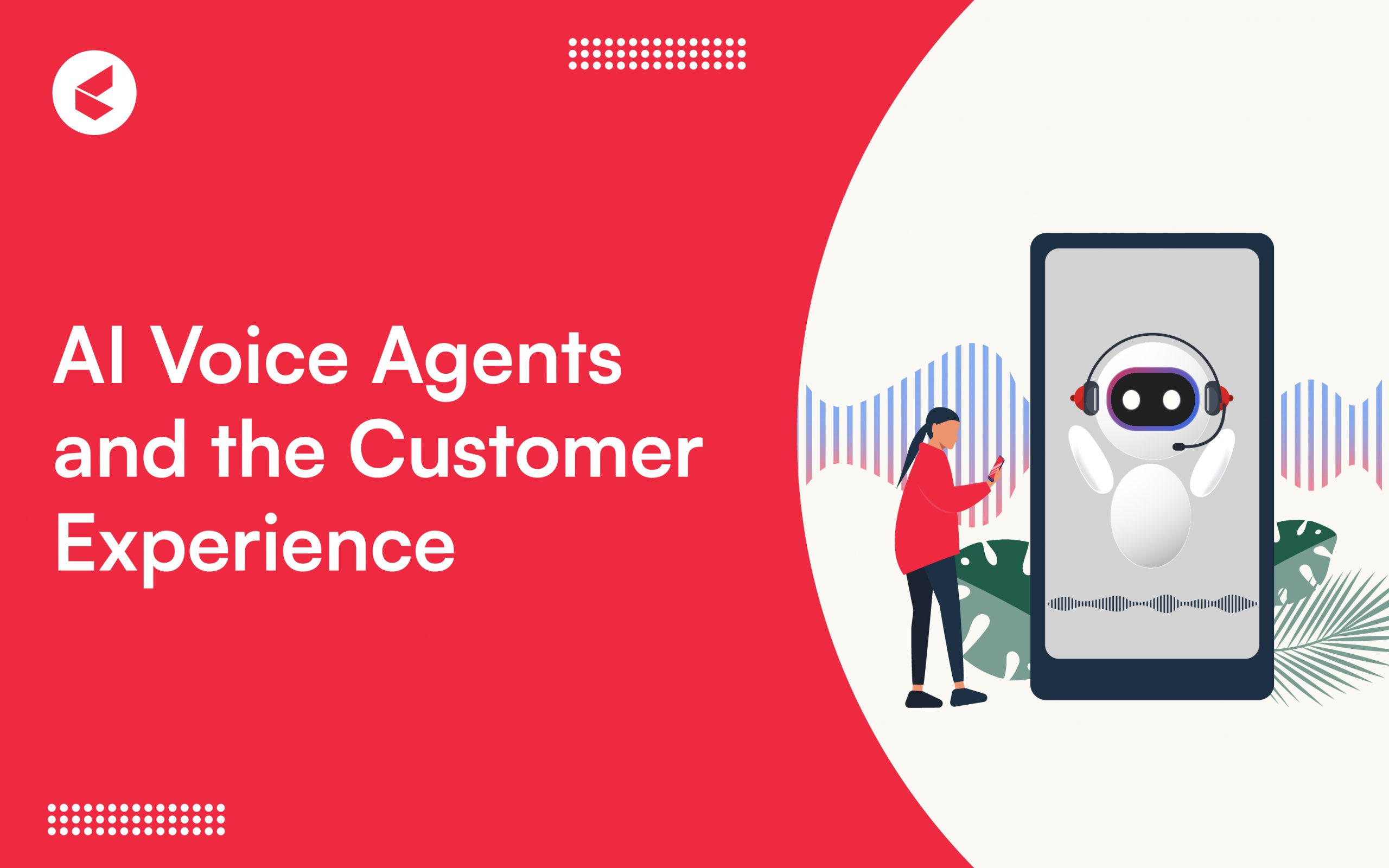Table of Contents
1 . What is an AI Voice Agent?
2 . Key Characteristics of an AI Voice Agent for Customer Experience
3 . Benefits of Implementing AI Voice Agents for Customer Experience
4. Top Use Cases for AI Voice Agent in Customer Service
5. Challenges and Limitations of AI Voice Agents
6. Best Practices for Implementing AI Voice Agents for Customer Experience
7. Future Trends in AI Voice Agents for Customer Experience
We are at the core of an ongoing transformation in customer service. Imagine a world where every customer query receives quick and accurate responses, free from time constraints. That world is here, driven by AI voice agents!
Research from MarketDigits indicates that the conversational AI industry is predicted to reach $34.7 billion by 2030, showing a remarkable increase in the use of AI for customer interactions.
As companies continue to expand their operations using AI to outperform the competition, customers require quick, consistent communication and solutions that fit their particular needs without explicit regard to time or location.
Companies are using creative technologies to adapt their interactions with customers and satisfy their changing needs.
AI voice agents are leading this change as tech innovators transform customer relations. Using artificial intelligence and natural language processing (NLP), AI voice agents interact with customers by mimicking human conversation. This makes every interaction more significant as they comprehend context, read emotions, and adjust their tone.
This technological breakthrough has made AI voice agent essential in enhancing customer experience strategies.
These agents offer a versatile solution to link operational efficiency with an outstanding customer experience. This article will discuss AI voice assistants as the future of customer service and examine how companies currently interact with their customers.
What is an AI Voice Agent?
AI voice agents are sophisticated conversational systems meant to provide real-time customer service experiences. Unlike conventional automated systems, these agents specialize in contextual awareness, adapting to customer demands, and facilitating genuine, human-like communication.
They can analyze the meaning behind questions, dynamically modify their answers, and even learn from prior encounters to enhance future performance—they are not simply responding to questions.
AI voice agents differ in their capacity to precisely manage difficult situations. They offer quick fixes, pick verbal nuances, and maintain a fluid discourse. Because of their special mix of contextual knowledge and flexibility, voice ai agent are a transformative tool for rethinking how companies interact with their customers.
Key Characteristics of an AI Voice Agent for Customer Experience
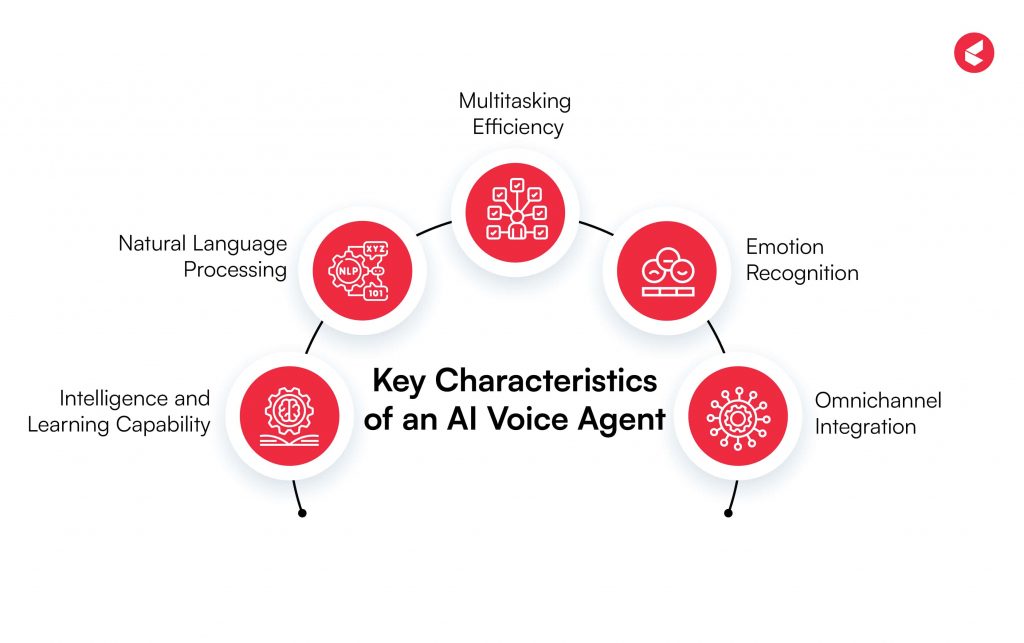
The following characteristics define an AI voice agent:
1. Intelligence and Learning Capability
Best AI voice agents utilize machine learning algorithms to continuously refine their responses and adapt to new scenarios, ensuring consistent improvement and relevance with every interaction.
Suppose a customer asks questions frequently about product troubleshooting, the AI can potentially offer options based on their past queries, thereby minimizing the overall resolution time.
2. Natural Language Processing
Natural language processing (NLP) allows AI voice agents to interpret language more precisely. Analyzing context, tone, and linguistic variations helps these bots understand regional dialects, slang, and idioms, maintaining effective communication among several user groups.
For instance, if a customer asks about a product, the AI voice agent can correctly understand their request and offer an appropriate answer regardless of the customer’s language or cultural background. This contextual awareness removes obstacles to effective communication and helps the conversation feel natural.
3. Multitasking Efficiency
An AI voice agent shines when it comes to managing several tasks at once. They can handle inquiries, schedule appointments, process payments, and offer updates—all in one seamless interaction.
Unlike human agents who get overwhelmed by various requests, AI voice agents can handle simultaneous inquiries, appointment bookings, payment processing, and provide real-time updates. AI voice agents can successfully meet the need for speed without compromising on the quality of customer care delivered
4. Emotion Recognition
Advanced AI voice agents come with sentiment analysis features, allowing them to understand the user’s emotional state and adjust their responses to fit the situation.
For instance, AI bots can be programmed to recognize the grievances of customers and then take the initiative to act in their best interests
5. Omnichannel Integration
These agents effortlessly blend with various communication channels, including email, chatbots, and social media platforms, to create a unified customer experience.
A voice AI agent mimics human interaction and harnesses AI’s incredible computational capabilities. This blend empowers businesses to provide quicker, more intelligent, and tailored services.
Benefits of Implementing AI Voice Agents for Customer Experience
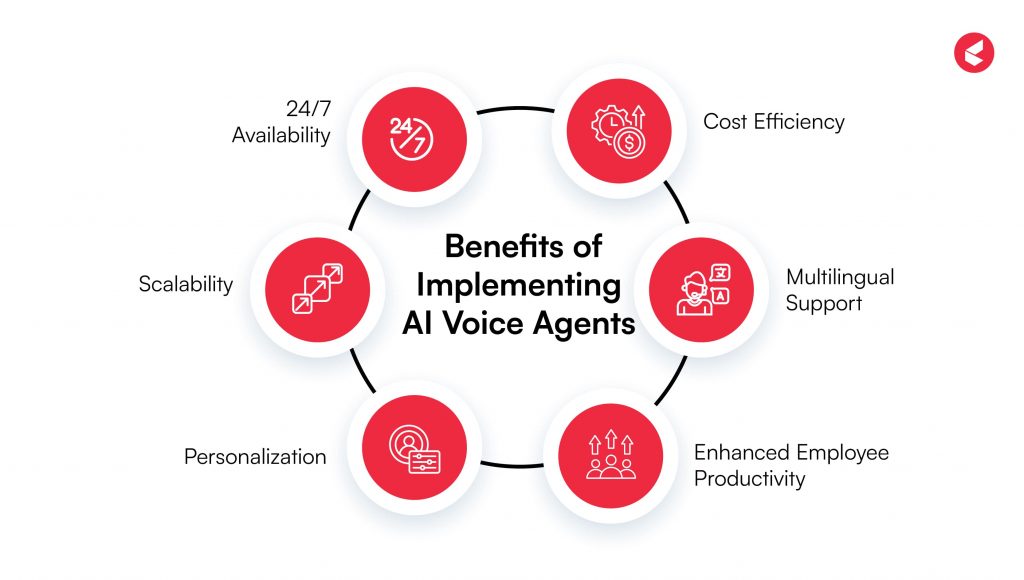
AI voice agents are transforming customer service, providing advantages that go far beyond improving operational efficiency. According to research from Deepgram, 82% of companies are embracing voice technology, showcasing the extensive adoption of AI voice agents in their business operations.
Let’s explore how these agents elevate the customer experience:
1. 24/7 Availability
One key benefit of implementing a voice AI agent is the capacity to deliver continuous service. In contrast to human agents, they are always ready to assist, tirelessly providing support whenever and wherever customers need it. This constant availability is especially vital for global businesses serving customers in various time zones.
For example, a global airline can use AI voice agents to help travelers with flight bookings, cancellations, and updates, even during busy times or holidays.
2. Scalability
Conventional customer service models find it challenging to handle rising demands. Voice AI agent can manage thousands of interactions at once, making sure every customer is attended to without delay. This scalability enhances customer satisfaction by allowing businesses to manage many queries at once, ensuring quick, consistent answers with minimal wait times.
During major shopping holidays like Black Friday, for example, retailers can use a voice AI agent for increased inquiries regarding products, discounts, and delivery timelines.
3. Personalization
According to IBM, 67% of customers feel frustrated when their interactions with businesses are not tailored to their requirements.
AI voice agent can provide a solution here. They examine customer data and customize their responses to fit individual needs. By addressing customers by name and using past interactions, these agents deliver a personal and impactful experience that increases customer satisfaction.
For instance, a subscription service can use Voice AI agent to suggest products based on a customer’s past purchases and preferences.
4. Cost Efficiency
Hiring, training, and keeping human agents can be costly, particularly for companies with high turnover rates. By automating repetitive operations, AI voice agent help companies employ their resources more effectively and minimize expenses. Furthermore, they reduce the need for major infrastructure, saving more money.
For example, a bank can let human agents concentrate on more complex financial consultations while using Voice AI agents to handle daily questions, including analyzing transaction history and monitoring account balances.
5. Consistency
Human agents, though talented, may occasionally deliver varying responses because of fatigue or miscommunication. By giving consistent responses, following set policies, and maintaining a coherent brand voice, AI voice agents offer a more seamless experience. With customers, this increases credibility and confidence.
A healthcare provider might use AI speech agents, for instance, to consistently offer information about treatment choices and appointment scheduling.
6. Improved Customer Satisfaction
AI voice agents work swiftly and effectively, cutting down on wait times and alleviating frustration. They create a smooth customer experience by offering immediate solutions and escalating complex issues to human agents when needed.
For instance, a telecommunications company can use AI voice agents to instantly address common technical issues, such as internet connectivity problems.
7. Multilingual Support
Multilingual Voice AI agent enable companies to service a worldwide customer base successfully. These agents remove language barriers by communicating fluently in several languages, ensuring that clients receive accurate and personalized help in their native language.
Regardless of the customer’s location or language inclination, a worldwide e-commerce platform can deploy AI voice agents to assist customers in French, Spanish, or Mandarin, promoting clear communication and trust.
8. Data-Driven Insights
AI voice agents collect and analyze interaction data, offering businesses insights into customer preferences and behavior. This can guide strategic decisions, including product development and marketing campaigns.
For instance, a travel agency can use insights from AI voice agent to identify trending destinations and customize promotional offers to match.
9. Enhanced Employee Productivity
According to Forbes, 60% of business owners think that using AI will increase their company’s productivity. AI voice agents automate repetitive tasks, allowing human agents to concentrate on those requiring critical thought and creativity. This improves employee morale and raises general standards of service excellence.
An insurance company can implement voice AI agent for policy renewals, allowing human agents to focus more effectively on resolving claims.
10. Future-Proofing Customer Service
Companies have to remain competitive as customer expectations change. AI voice agents provide a flexible and dynamic solution that can grow and change with technological progress, guaranteeing their lasting significance.
For example, a tech startup can harness AI voice agents to provide exceptional customer support and establish itself as a pioneering and visionary brand.
Top Use Cases for AI Voice Agent in Customer Service
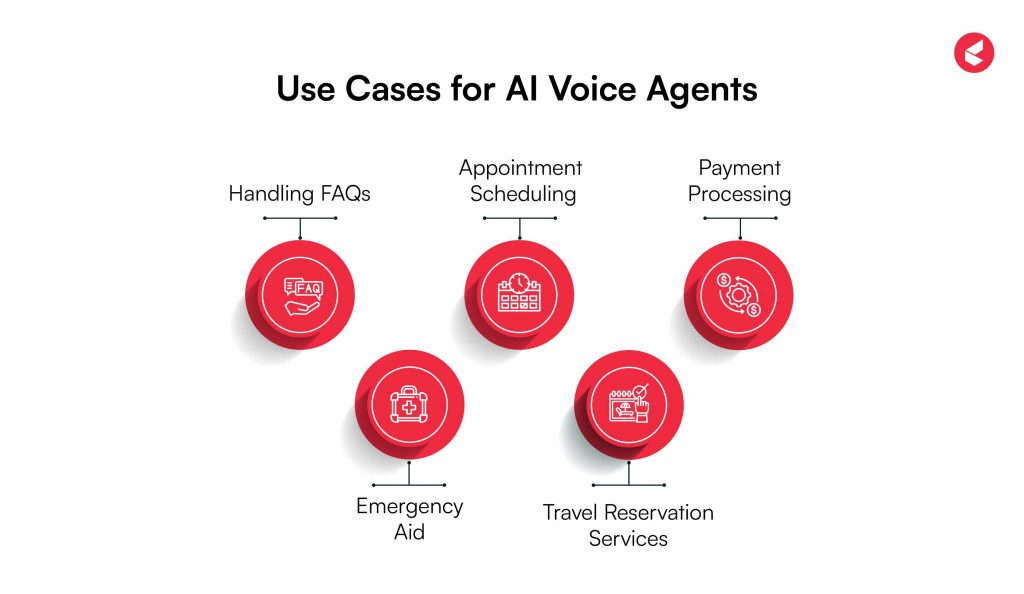
Through work automation and increased operational efficiency, AI voice agents are revolutionizing customer service in many different sectors. According to Gartner, 80% of customer service and support organizations will be using generative AI technologies by 2025 to raise agent efficiency and improve the customer experience.
Check out these notable use cases:
- Handling Frequently Asked Questions: AI voice agents offer timely answers to frequently asked queries concerning products and services. This reduces work for human agents and ensures that clients receive timely information.
- Appointment Scheduling and Reminders: AI voice agents handle appointment scheduling, cancellations, and rescheduling to simplify the experience for customers and service providers.
- Technical Support: AI voice assistants help customers walk through the process of addressing technical problems, such as troubleshooting connectivity problems, guiding device setup, or resolving software errors.
- Getting Feedback from Customers: AI voice agents can send surveys and gather comments from clients, providing insightful analysis of customer satisfaction.
- Customized Suggestions: AI voice assistants can use customer data to offer recommendations for goods or services depending on customer preferences.
- Payment Processing: Customers can use AI voice assistants to handle billing questions and make payments.
- Emergency Aid: During emergencies, AI voice agents can offer real-time guidance through evacuation protocols, provide simple first aid instructions, or connect customers to emergency services.
- Travel Reservation Services: AI voice agents can help customers make reservations for hotels and flights and for a smooth travel schedule.
Challenges and Limitations of AI Voice Agents
AI voice agents bring a wealth of advantages, yet they also come with specific challenges and limitations:
- Tackling Complicated Queries: AI voice agent may find it challenging to tackle complex or confusing queries, leading to erroneous responses.
- Accents and Dialects: Speech variations, such as accents and dialects, can influence the agent’s capacity to address customer inquiries.
- Security and Privacy Concerns: Sensitive customer information demands strong security measures to prevent data breaches.
- Integration with Existing Systems: Integrating AI voice agent with existing customer service platforms and databases can be a resource-heavy endeavor.
- Maintenance and Updates: Regular updates and maintenance ensure Voice AI agent operate at their best, often necessitating continuous investment.
Best Practices for Implementing AI Voice Agents for Customer Experience
To fully harness the advantages of AI voice agent while addressing potential challenges, keep these best practices in mind:
- Define Clear Objectives: Clearly define the objectives for using AI voice agents—such as lowering response times or reducing running expenses.
- Prioritize Data Security: Prioritize data security and follow relevant privacy rules to protect client data. Doing so will build confidence with your clients.
- Provide Multilingual Support: Equip AI voice agent with the tools to interact in multiple languages so they can cater to a diverse clientele and increase accessibility.
- Regularly Update and Train: Routinely update Voice AI agent with the most recent data and train them to address new client requests so that they are in tune with present demands.
- Monitor Performance Metrics: Track Key Performance Indicators (KPIs), including response accuracy, average resolution time, first-call resolution rate, customer satisfaction scores (CSAT), and interaction volume, to assess voice AI agent performance.
- Facilitate Human Escalation: Ensure that Voice AI agent can transfer complex or sensitive issues to human agents, maintaining a high standard of customer service.
- Gather Customer Feedback: Collect and analyze customer feedback to identify areas for enhancement and fine-tune the AI voice agent’s performance accordingly.
Future Trends in AI Voice Agents for Customer Experience
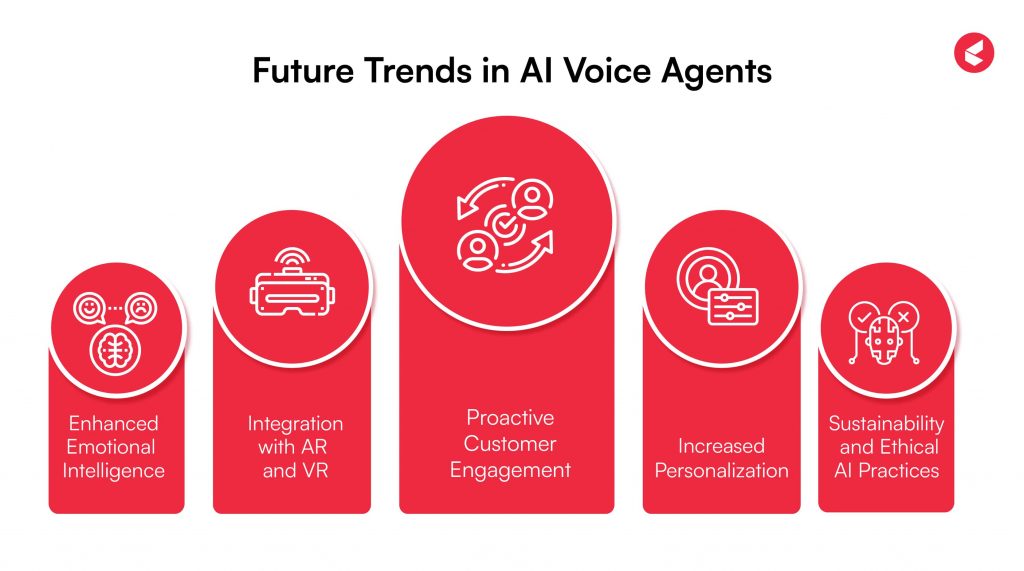
The rapid advancement of AI voice agent is exposing interesting new prospects when included in customer experience tactics. Consider the following trends influencing the direction of these tools in the future:
1. Enhanced Emotional Intelligence
AI voice agents are poised to grow from basic conversations to understanding and reacting to the emotional subtleties of a conversation. These agents will detect emotions, including frustration, satisfaction, or perplexity, using sentiment analysis and modern machine learning techniques.
This emotional awareness enables them to modify their tone, provide empathetic responses, or escalate issues to human agents when needed.
Imagine a travel company’s voice AI agent that can sense the stress in a customer’s tone during a flight cancellation. It responds with reassurance, quickly presenting alternative solutions to ease the situation.
2. Integration with Augmented Reality (AR) and Virtual Reality (VR)
Combining AI voice agent with AR and VR technology can transform interactive client encounters. Voice agents will be virtual assistants guiding customers through engaging experiences in fields including retail, real estate, and gaming.
A real estate company could use AI voice agents during VR tours to respond to property inquiries and offer extra insights while customers navigate through virtual homes.
3. Proactive Customer Engagement
AI voice agent are evolving from merely responding to customers to actively engaging with them. With predictive analytics and customer data, they foresee needs and spark conversations before customers even identify a problem.
A telecom provider’s AI voice agent can alert customers when they exceed their data limit and recommend an appropriate upgrade plan to prevent service interruptions.
For example, In retail, they can notify customers about restocked favorite items or exclusive deals. Business can offer relevant, and personalized recommendations to improve engagement, strengthen loyalty, and enhance the overall customer experience.
4. Increased Personalization
Personalization is key in shaping customer experience strategies. Future AI voice agent will utilize customer data to create uniquely tailored experiences. By addressing customers by name and recalling their preferences and purchase history, these agents will foster a strong sense of connection and loyalty.
An AI voice agent from a subscription service could suggest exciting new content or products tailored to the customer’s previous interactions and preferences.
In e-commerce, AI voice agents will give personalized product recommendations and exclusive offers to improve retention. In streaming services, they can curate personalized playlists or movie suggestions based on these prior viewing histories. Financial institutions will undertake efforts to provide individualized budgeting tips, investment advice, and fraud alerts.
The AI voice agent will keep learning from every interaction, begin to predict the customer’s needs, and deliver a seamless, intuitive, engaging experience across industries.
5. Industry-Specific Customization
AI voice agents will increasingly customize to meet the unique needs of diverse industries. In healthcare, for instance, they can help by scheduling appointments, providing general information about services, or answering frequently asked questions about billing.
A voice AI agent can provide patients with general information about prescriptions, such as usage instructions or potential side effects, or keep track of their doctor’s appointment schedules.
6. Sustainability and Ethical AI Practices
With the progression of AI technologies, there will be an increasing emphasis on sustainability and ethical practices in AI. AI voice agents will be crafted using energy-efficient models and clear algorithms to tackle worries about bias and environmental effects.
Companies might focus on ethical AI in their voice agents, guaranteeing unbiased responses and developing inclusivity across various demographics.
Basically, Google and Microsoft are working on AI models that consume less power and maintain high accuracy. Similarly, banks and financial institutions will utilize AI in voice agents to refrain from discriminatory lending decisions, such as analyzing search queries collected from customers without bias.
7. Real-Time Adaptation Through Feedback
In the future, AI voice agents will evolve and adjust instantly, responding to customer feedback and emerging trends. This ongoing learning capability will enable them to remain relevant and impactful as customer needs change.
A retail AI voice agent can swiftly adjust to seasonal trends and provide tailored recommendations for holiday shopping.
For instance, e-commerce platforms like Amazon and Walmart can use AI voice agents to identify customer preferences during the sale events and recommend suitable products. Moreover, telecom companies can use real-time feedback to fine-tune troubleshooting instructions and thereby reduce escalations to human agents.
Conclusion: The Impact of AI Voice Agents on the Future of Customer Experience
The future of customer service is all about seamlessly integrating AI voice agents into daily business operations. These intelligent agents are revolutionizing the way companies engage with their customers while establishing new standards for efficiency, personalization, and accessibility.
With the ongoing advancements in AI technology, voice agent will become increasingly intuitive, emotionally intelligent, and tailored to meet the distinct needs of every customer. By providing quicker solutions and round-the-clock availability, Voice AI agent establish themselves as customer-focused brands that can excel in a competitive environment.
Are you prepared to take your customer service strategy to the next level? Kapture CX presents advanced AI-driven solutions featuring voice agents designed to transform customer interactions.
Kapture CX offers customized, industry-specific capabilities, smoothly integrates into your existing systems, and maintains a proven track record of enhancing customer satisfaction. It allows businesses to deliver exceptional, efficient, and personalized experiences.
Reach out today to transform your customer experience with Kapture CX.
FAQs
- What is an AI voice agent?
An AI voice agent is an advanced form of a conversational AI system that engages customers using natural language processing (NLP) and speech recognition. It automates tasks such as answering questions, scheduling appointments, and providing support.
Unlike traditional IVR systems, it understands intent and can respond contextually. AI voice agents are available for interaction, round the clock, so they afford a means of improving accessibility while increasing efficiency. Businesses deploy them to enrich the customer experience while reducing operating costs.
- What are the benefits of using AI voice agents in customer service?
The most productive operation of an AI voice assistant is instant responses-shortened waiting time, resulting in greater customer satisfaction.
Such an AI can deal with a lot of questions simultaneously, which helps it tend to solve problems faster. They support 24/7 with high consistency across different time zones.
Automated query resolution allows human agents to devote greater time to more difficult problems. AI insights help businesses personalize client interactions and improve service strategies.
- How do AI Voice Agents enhance efficiency?
AI voice agents manage call units independently of human intervention, ensuring the answering process can scale. AI reduces average handling time by fetching customer information instantly.
Real-time sentiment analysis helps customize the response according to a customer’s feelings. They avoid errors and inconsistencies in the responses, thus enhancing the quality of service.
Integration with customer relationship management (CRM) and databases allows seamless, personalized customer conversations.
- How do you think AI voice agents will change marketing?
AI voice agents will tailor marketing efforts by having real-time conversations with customers. They will streamline lead qualification, allowing sales teams to concentrate on the most promising prospects.
Voice search optimization will transform SEO strategies to cater to voice-activated queries. Interactions powered by AI will boost brand engagement with personalized suggestions. Companies will leverage these tools for proactive outreach, leading to higher conversion rates.
- Can AI voice agents be integrated with existing customer support systems?
Yes, they integrate with CRM, helpdesk, and ticketing systems to create a seamless workflow with AI voice agents into CRMs, helpdesks, and ticketing systems. API-based integration can achieve real-time data sharing and automation of responses.
Then, they’re more intelligent, adding a conversational element to existing IVR systems. Businesses can customize AI voice agents to fit their intended support strategy. Integration thus drives up efficiency, lowers costs, and improves customer satisfaction.
